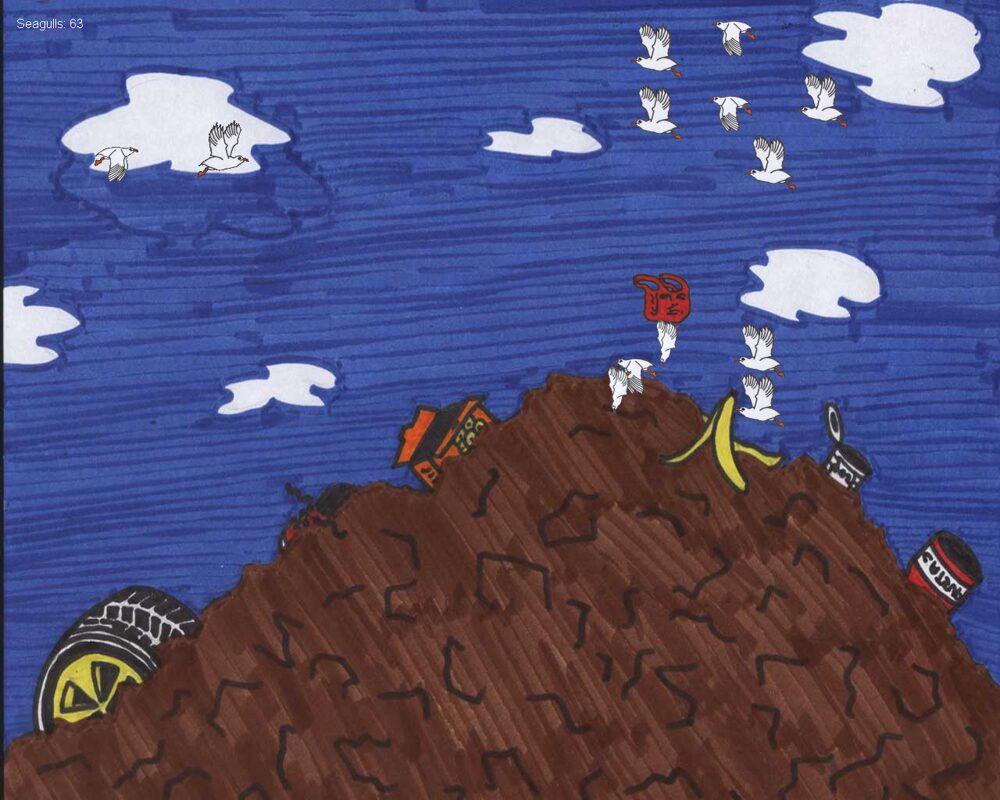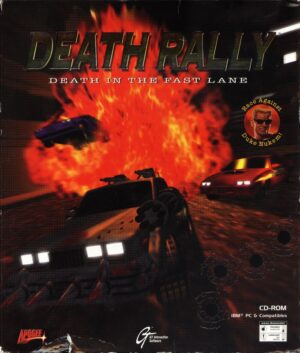Retro Replay Review
Gameplay
Plastico Baggara delivers a delightfully unconventional platforming experience that cleverly combines light combat mechanics with precision-based traversal. Players take control of the titular shopping bag, mastering short hops and delicate flutters as they navigate the treacherous expanse of a sprawling landfill. The core movement feels tight and responsive, encouraging experimentation with aerial momentum and timed bounces off gritty surfaces.
(HEY YOU!! We hope you enjoy! We try not to run ads. So basically, this is a very expensive hobby running this site. Please consider joining us for updates, forums, and more. Network w/ us to make some cash or friends while retro gaming, and you can win some free retro games for posting. Okay, carry on 👍)
The game’s signature mechanic revolves around ensnaring seagulls mid-flight, using your bag’s opening as a makeshift trap. Each captured gull temporarily lightens the load, granting you extra lift and allowing access to hidden areas. As the levels progress, gulls become more agile and aggressive, demanding increasingly strategic timing and positioning for successful captures. The intuitive lock-on indicator and slow-motion dodge frames ensure that the action remains fair, even during hectic skirmishes.
Beyond solo leaps, Plastico Baggara introduces two pivotal allies: El Jefe, a sturdy black garbage bag that serves as a dynamic trampoline, and Li’l Zip, a zip-loc baggie capable of launching you to the highest platforms. Unlocking and utilizing these companions adds a fresh layer of puzzle-platforming, as some zones require careful coordination between all three bagfolk to unveil secret caches or overcome particularly stubborn flocks of seagulls. This buddy system maintains gameplay variety without ever feeling gimmicky.
Graphics
The visual design of Plastico Baggara strikes a fine balance between grimy realism and playful cartoonish flair. The landfill environment sprawls with convincing detail—rusted barrels, crumpled newspapers, and patches of toxic sludge form both aesthetic backdrop and interactive hazards. Day-night cycles and dynamic weather further enrich the world, casting shifting shadows that can obscure hidden perches or reveal new vantage points.
Character models are imbued with personality: Plastico Baggara’s burlap-like texture and subtle flutter animations convey a sense of life, while the gulls’ feathered wings and taunting caws evoke genuine menace. El Jefe sports gleaming plastic seams that catch light realistically, and Li’l Zip’s translucent walls refract sunlight in a manner that feels remarkably tactile. The color palette, though anchored in earthy browns and muted grays, is punctuated by vibrant details—bright hazard stripes, neon spray-paint tags, and bioluminescent fungi—that guide the player’s eye through each level.
Performance is rock-solid across both consoles and PC, with steady frame rates even when dozens of seagulls flock in unison or environmental debris cascades from above. Subtle particle effects—scurrying vermin, drifting leaves, and swirling dust motes—layer the stages with atmosphere without ever compromising responsiveness. The result is a world that feels both oppressive and strangely inviting, coaxing players deeper into its landfill confines.
Story
At its core, Plastico Baggara weaves a simple yet charming tale of revolution among the discarded. The game opens with a cinematic introduction to the landfill hierarchy: seagulls as self-proclaimed overlords, leaving piles of droppings in their wake. Into this dismal tableau steps Plastico Baggara, a humble shopping bag with an unquenchable thirst for freedom and cleanliness. From the first flutter, you’re invested in this underdog hero’s quest to liberate the bagfolk from avian tyranny.
Story progression unfolds through brief but memorable vignettes, voiced by a humorous cast that includes a squeaky narrator and a conspiracy-theorist garden hose. Dialogue is witty without ever feeling forced, and each new ally—El Jefe and Li’l Zip—brings its own backstory and motivations. Their interactions with Plastico range from sarcastic banter to heartfelt solidarity, giving weight to what could otherwise be a purely mechanical journey.
While the narrative arc follows a traditional “gather your forces, strike the oppressors, claim victory” structure, it’s enriched by thematic undercurrents about environmental stewardship and the overlooked value of discarded items. Subplots hint at deeper landfill lore—forgotten appliances with unfinished business, sentient gummy worms, and the looming threat of big machinery from beyond the dump’s fence. These threads set the stage for potential expansions or sequels, leaving players eager for more.
Overall Experience
Plastico Baggara offers a refreshingly quirky adventure that marries strong level design with an endearing narrative. Its unique premise—a shopping bag uprising—stands out in a crowded platformer market, and the developers have backed it up with tight controls, smart AI patterns, and a steady stream of surprises. Veteran platforming fans will appreciate the nuanced jump mechanics, while newcomers will find the difficulty curve approachable thanks to generous checkpoints and optional assist modes.
The game’s world-building goes beyond mere aesthetic: every scrap of trash, animated billboard, and recycle bin cutscene contributes to a cohesive sense of place. Sound design and soundtrack complement the visuals beautifully, featuring industrial percussion, subtle ambient hums, and jaunty melodies that underscore moments of triumph. Boss encounters against giant alpha gulls feel epic yet never frustrating, thanks to clear telegraphs and satisfying counterplay.
Replay value is high, with collectible side missions that challenge you to clear stages under time limits or using only certain bagfolk abilities. Hidden pathways and secret dialogues reward exploration, making completionists feel right at home. In the grand scheme, Plastico Baggara proves that even the lowliest of landfill dwellers can deliver a polished, heartwarming, and downright fun gaming experience. Whether you’re drawn by the novel concept or simply seeking a platformer with character, this game deserves a place on your shelf.
 Retro Replay Retro Replay gaming reviews, news, emulation, geek stuff and more!
Retro Replay Retro Replay gaming reviews, news, emulation, geek stuff and more!








Reviews
There are no reviews yet.